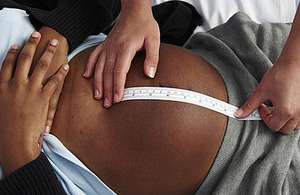Alert issued to pregnant women in London following reports of toxic ‘antidote’ to morning sickness
PHE are warning pregnant women against using a potentially poisonous product, 'Calabash chalk', as a nutritional supplement or morning sickness ‘antidote’.

Pregnant woman at routine checkup
Public Health England (PHE) are warning pregnant women against the use of a potentially poisonous chalk product as a nutritional supplement or morning sickness ‘antidote’. The warning follows reports of use of ‘Calabash chalk’ by pregnant women in Asian and African communities in London.
The chalk, often called ‘Calabash chalk’ but also known as Argile, La Craie, Mabele, Nzu or Shiley, was recently seized by Environmental Health officers in London and was shown to have elevated levels of the metals lead and arsenic, both toxic to humans. Lead exposure during pregnancy can cause reduced birth weights, impaired neurodevelopment and impaired intrauterine growth.
The Food Standards Agency (FSA) has issued advice that these products should not be eaten, especially by pregnant and nursing mothers, due to the possibility of these products being toxic.
Diane Benford, from the FSA, said:
Tests of Calabash Chalk previously taken by the FSA have shown high levels of lead. For pregnant women, eating this product may result in harmful effects to their unborn baby, which is particularly at risk of effects on the nervous system.
The FSA has issued hazard warnings to request that local authorities visit food businesses and remove Calabash Chalk from sale. It is also working with the Department of Health, health professionals and consumer groups to communicate this information to pregnant and nursing mothers, particularly in the communities who are likely to eat Calabash Chalk or similar products.
Dr Yvonne Doyle, regional director for PHE London, said:
It is of great concern to us that pregnant women may be taking these chalk products as a nutritional supplement during pregnancy. Exposure to heavy metals, like lead, should be kept as low as practically possible under all circumstances, but particularly during pregnancy when the risk of adverse effects is large.
If you are suffering from severe morning sickness during pregnancy you should speak to your GP or midwife who will be able to advise you on safe treatment. We strongly advise against taking any medicinal or ‘remedy’ product while pregnant without talking to your GP or health visitor about the health risk.
Ends
Notes to editors
-
Effects of exposure to Calabash Chalk: Adverse effects of lead exposure during pregnancy include impaired intrauterine growth, reduced birth weights and impaired neurodevelopment. The negative effects on a foetus or a growing child can be more marked as their growing bodies absorb lead (Pb) more readily, and do not have the same capacity to excrete heavy metals as efficiently as an adult. Chronic or prolonged uses of these products have also been linked to iron-deficiency anaemia and also of inhibiting the body’s ability to absorb zinc. Iron and zinc are essential nutrients for good health.
-
There is also a risk of intestinal blockage and digestive upset from use of these products.
-
For further information, please see: Public Health England, Calabash Chalk leaflet.
-
Recent tests on samples of Calabash Chalk, seized by Environmental Health Officers in London, have identified elevated levels of the metals lead (Pb) and/or occasionally arsenic (As).
-
Often called Calabash Chalk, the product is also known as Argile, La Craie, Mabele, Nzu or Shiley. Similarly, a type of clay used during pregnancy for similar purposes is commonly called Sikor or Shikor Mati.
-
The Food Standards Agency (FSA) has issued advice that these products should not be eaten, especially by pregnant and nursing mothers, due to the possibility of these products having adverse effects on health. Further information from the FSA, including answers to common questions, on the FSA website.